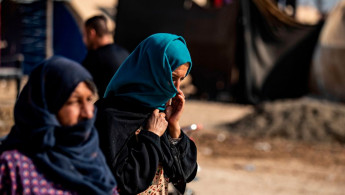Syrian women in 'widow camps' face chronic violence and sexual abuse: report
Syrian women living in so-called "widow camps" in northwest Syria face chronic violence, and high needs and are sometimes pushed into "survival sex", a new report by humanitarian NGO World Vision revealed on Monday.
"Widow camps" are among the most hard-to-reach places in northwest Syria. There are no international NGOs that work in the camps, which are managed by local authorities.
The camps are home to tens of thousands of single women, most of whom are widowed or divorced.
Many of the women are pushed to live in these camps by concerns over their safety, or conservative social norms that discourage single women from living in mixed-gender settings. Some simply have nowhere else to go.
"I was in a Syrian widow camp last week, where I witnessed the unbearable pain suffered by widowed mothers, who are battling depression and crying for help," Alexandra Matei, one of the report's lead authors, told The New Arab.
"The mothers I met last week feel that they and their children have been left to rot in widow camps with limited to no access to education, psychosocial support, medical care and other essential services."
Most of the women are not allowed to leave the camps freely, so they cannot work outside to support themselves and their children. Some women say they have to engage in so-called 'survival sex' with male guards and camp managers.
World Vision interviewed over 400 people across 28 of these camps and found that children living in "widow camps" are confronted with exceptionally high levels of violence.
This is especially true for boys, who are considered male adults by the community at the age of eleven, and are forced to leave the camp despite having nowhere to go.
Child labour is also rampant, affecting about half of children above 11. Around 34 percent of children say they have experienced some form of violence. Meanwhile, 25 percent of women said they had witnessed sexual violence in the camp. Nearly all of the women interviewed for the report felt "hopeless" about their situation.
The NGO called on international donors, who will be meeting next month in Brussels to pledge funding for the Syrian humanitarian crisis, to "prioritise mothers and children who are at breaking point in Syria's widow camps".
The war in Syria was sparked by dictator Bashar al-Assad's brutal crackdown on protesters calling him to leave power in 2011.
Since then, the conflict has made one-third of Syrians refugees, and millions more are internally displaced.
Around four million people - half of them displaced - now live in northwest Syria, the last enclave fighting Assad despite years of deadly Russian-backed offensives.
"For more than eleven years now [Syrians] have been forced to endure the atrocities conflict brings, and for many, it seems like the world has forgotten them," Matei said.
"Just imagine what that is like, unbearable for eleven days even, but eleven years? It’s incomprehensible."





 Follow the Middle East's top stories in English at The New Arab on Google News
Follow the Middle East's top stories in English at The New Arab on Google News
![22 Arab countries at COP29 have rejected the targeting of fossil fuels [Getty]](/sites/default/files/styles/image_330x185/public/2024-11/GettyImages-2184289638.jpg?h=199d8c1f&itok=ptHl5bec)
![Dozens of people turned out for the funerals [Getty]](/sites/default/files/styles/image_330x185/public/2024-11/GettyImages-2185229760.jpg?h=e7c891e8&itok=1bctDcE6)
![The UAE is widely suspected of arming the RSF militia [Getty]](/sites/default/files/styles/image_330x185/public/2024-11/GettyImages-472529908.jpg?h=69f2b9d0&itok=Yauw3YTG)